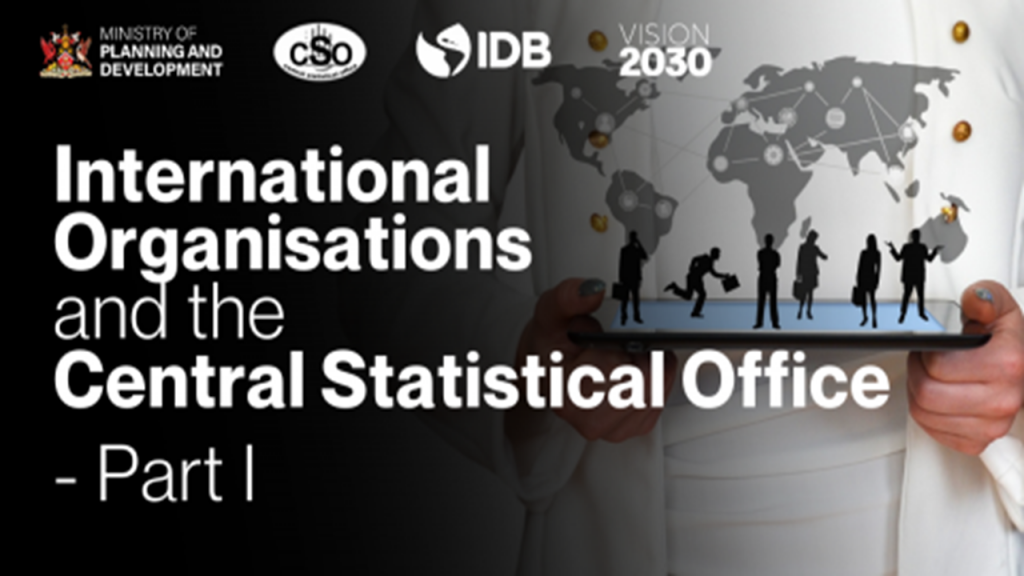The Central Statistical Office (CSO) is tasked with data collection, analysis and dissemination in Trinidad and Tobago. These official statistics provide detailed qualitative data that is representative of the social and economic state of the country. International organisations such as the International Monetary Fund (IMF), the Food and Agriculture Organization of the United Nations (FAO), the International Labour Organization (ILO), and the Caribbean Regional Technical Assistance Centre (CARTAC) also rely on national statistics to develop their initiatives and inform their understanding of national economies.
Established in 1944, the International Monetary Fund (IMF) promotes international financial stability and cooperation. It facilitates international trade, fosters sustainable economic growth, and aims to reduce global poverty levels. It is governed and held accountable by its 190 member countries; our twin-island Trinidad and Tobago became a member of the IMF in 1963.
The IMF is also responsible for providing loans to member countries to stabilize economies and rebuild monetary reserves while addressing underlying financial problems; monitoring global economic trends and developments in order to identify risks and offer recommendations to governments; and providing training and technical assistance to central banks, finance ministries, and revenue administrations to encourage capacity development.
Analysis of a country’s economic health is conducted by the IMF and informed by data derived from national statistical agencies such as the Central Statistical Office (CSO).
The IMF peer reviews the CSO’s statistics via the Article IV REVIEW. During an Article IV consultation, an IMF team of economists visits a country to assess economic and financial developments and discuss the country’s economic and financial policies with government and central bank officials.
It is critical that CSO provides accurate, timely data. This is then used for key economic indicators. One such indicator, the Retail Price Index (RPI), uses the CSO’s Household Budget Survey (HBS) to determine the rate of inflation.
The CSO’s Continuous Sample Survey of Population (CSSP), used to obtain Labour Force data, and Agriculture surveys provide data that are utilised by international organisations such as the IMF, the ILO and the FAO in their statistical and economic assessment of Trinidad and Tobago.
Other CSO outputs such as the Index of Producer Price (IPP) and the Index of Domestic Production (DPI) are used to measure price and volume changes for the Manufacturing Industry and which also function as important inputs in the measurement of GDP.
The CSO and other statistical organisations in Trinidad and Tobago also participate in the IMF’s Enhanced General Data Dissemination System (e-GDDS) which encourages members to improve data quality, provide data to the public, evaluate areas for improvements and monitor progress.
In a 2019 Newsday article, Minister of Planning and Development Camille Robinson-Regis stated that “It is important for a country to have a statistical institute where the data is reliable, that people can trust the data and we have been ensuring that we have been moving in that direction…”
Statistical reform has progressed thanks to the technical assistance provided by the IMF’s Caribbean Regional Technical Assistance Centre (CARTAC). These Centres, located around the world, were created to strengthen a country’s capacity to develop and implement sound macroeconomic policies which promote growth and reduce poverty.
CARTAC provides technical assistance in five key areas:
● Public finance management
● Tax and Customs Administration
● Financial Sector Supervision and Stability
● Economic and Financial Statistics, and
● Macroeconomic Programming Analysis
Locally, CARTAC has helped improve the quality of data gathered for the retail, producer and trade price indices; advised on the CSO’s Household Budget Survey; and improved the GDP estimates.
In 2017, assistance from CARTAC resulted in revised trade statistics, a higher current account surplus, a significant reduction in the current account deficit, and a revision of the current account balance which ultimately improved Trinidad and Tobago’s external economic position.
Credit rating agencies rely on statistical information from national financial and data collection organisations to provide an accurate assessment of a country’s economic position. Credit ratings are independent assessments that give investors insights into the levels of risks associated with doing business in a particular country. Both the economic and political environments are considered in their evaluations.
Developing countries such as Trinidad and Tobago often request credit ratings to provide a level of assurance to foreign investors and also to be able to gain access to international funding opportunities.
The most influential credit rating agencies are Standard and Poor’s (S&P), Moody’s and Fitch Ratings. Ratings range from AAA for the highest-quality, lowest-risk countries down to C for countries in default who may have difficulties repaying their debt.
A country’s rating is impacted by its economic profile, the exchange rate, the inflation rate and the political climate. Therefore, the work of statistical institutions such as the CSO is paramount in determining the national credit rating.
In the first half of 2020, according to a media release from the Ministry of Finance:-
- Moody’s gave Trinidad and Tobago a Ba1 rating which falls within the midrange showing that there is some risk of default but it is a safer investment than others;
- Standard and Poor’s rating for that period was BBB-.
The ongoing transformation of the Central Statistical Office into an autonomous and efficient National Statistics Institute of Trinidad and Tobago is expected to address challenges that the organisation has experienced in producing some macroeconomic data.
Author: Central Statistical Office

